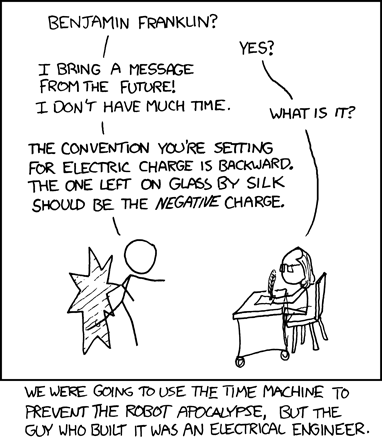JustJason
Vice Admiral
- Joined
- Aug 27, 2007
- Messages
- 5,358
Re: Spark plug tech question?
I understand that the block is just a path in the circuit. Just a hunk of metal conductor... it doesn't matter if it a pig iron big block, or an aluminum kicker, if there are good connections then voltage drop will be minimal across the block.
What I was getting at was were voltage begins and ends, and where current begins and ends.
As far as I know, and am I by no means an electrical engineer or electrician. (although yes I do have a diploma in marine technology, and eletrical sytems were part of that diploma). That voltage starts and ends at the battery. It doesn't really matter if you feel it starts at the + or - terminal. It matters more that there is a complete loop. In a battery, voltage is the potential difference between the positive and negative terminals... and thats it. Was ben franklin truely wrong... or was he correct? Are electrons negatively charged? Or are they positively charged? True we have many electrical "laws", ohms, watts, etc. But when it comes down to it we have Electron theory and Conventional theory. We do not have Electron or Convential Law.
So that takes care of voltage. Current on the other hand comes from the positive terminal of a battery, where there is a surplus of electrons, and stops at the load in the circuit. At the load current is converted into work/power plus heat because of every loads resistance. If there was no resistance then obviously it would be a short.
That being said. The potential difference remains the same (not accounting for the load drop) across the circuit.
If current traveled throught he block backwards, then everything would have to be diode isolated, which it is not. The only reason putting an amp clamp on either + or - shows the same is because the amp clamp is measuring the magnetic field the wire itself is making, under load, and converting that field strength into a number in amps. It's not actually measuring amps directly.
Buy into whatever theory you choose. If you design circuit boards all day long i'm sure you buy into 1 theory more than another. All I know is what works in boats dudes.
I understand that the block is just a path in the circuit. Just a hunk of metal conductor... it doesn't matter if it a pig iron big block, or an aluminum kicker, if there are good connections then voltage drop will be minimal across the block.
What I was getting at was were voltage begins and ends, and where current begins and ends.
As far as I know, and am I by no means an electrical engineer or electrician. (although yes I do have a diploma in marine technology, and eletrical sytems were part of that diploma). That voltage starts and ends at the battery. It doesn't really matter if you feel it starts at the + or - terminal. It matters more that there is a complete loop. In a battery, voltage is the potential difference between the positive and negative terminals... and thats it. Was ben franklin truely wrong... or was he correct? Are electrons negatively charged? Or are they positively charged? True we have many electrical "laws", ohms, watts, etc. But when it comes down to it we have Electron theory and Conventional theory. We do not have Electron or Convential Law.
So that takes care of voltage. Current on the other hand comes from the positive terminal of a battery, where there is a surplus of electrons, and stops at the load in the circuit. At the load current is converted into work/power plus heat because of every loads resistance. If there was no resistance then obviously it would be a short.
That being said. The potential difference remains the same (not accounting for the load drop) across the circuit.
If current traveled throught he block backwards, then everything would have to be diode isolated, which it is not. The only reason putting an amp clamp on either + or - shows the same is because the amp clamp is measuring the magnetic field the wire itself is making, under load, and converting that field strength into a number in amps. It's not actually measuring amps directly.
Buy into whatever theory you choose. If you design circuit boards all day long i'm sure you buy into 1 theory more than another. All I know is what works in boats dudes.




















